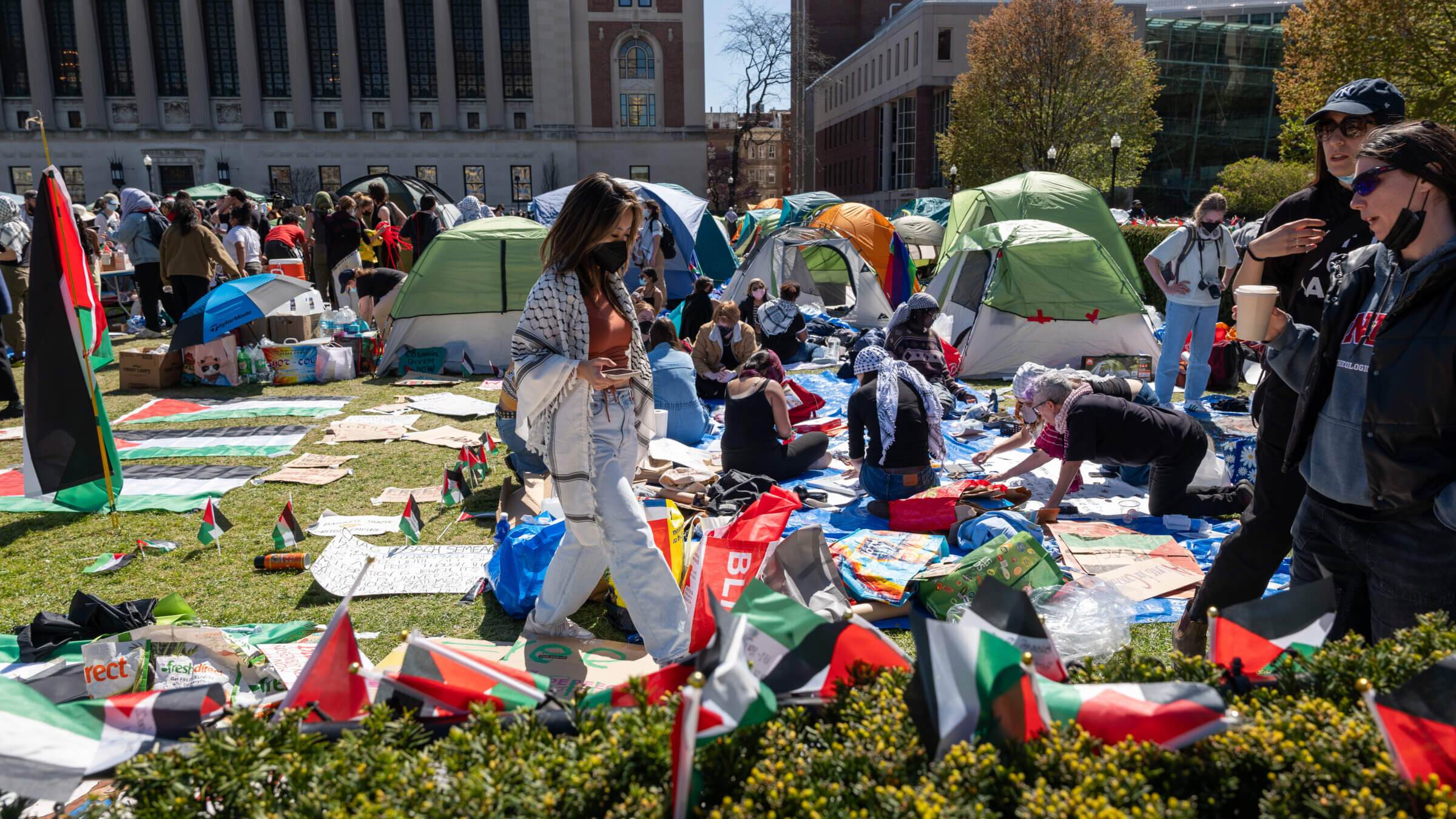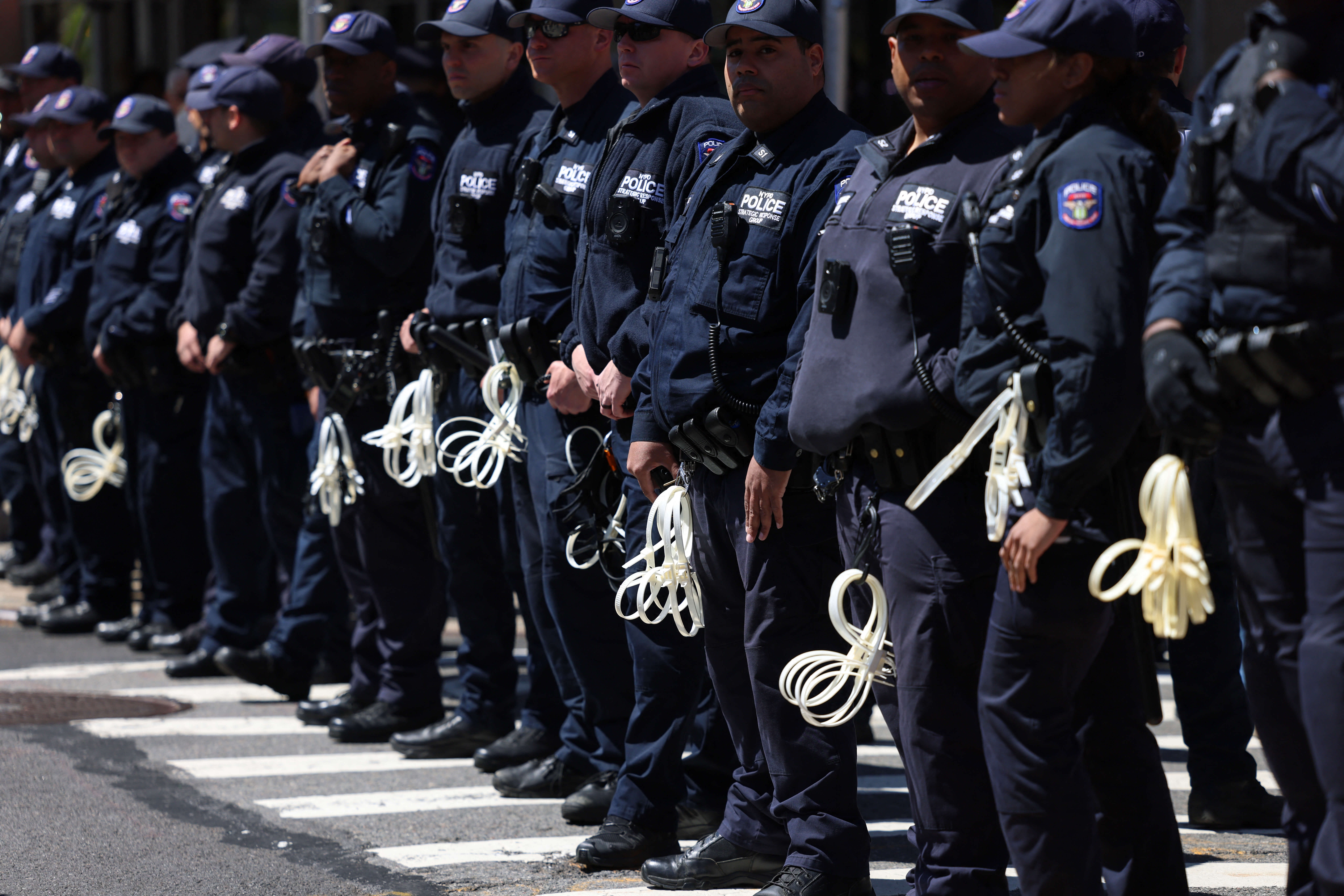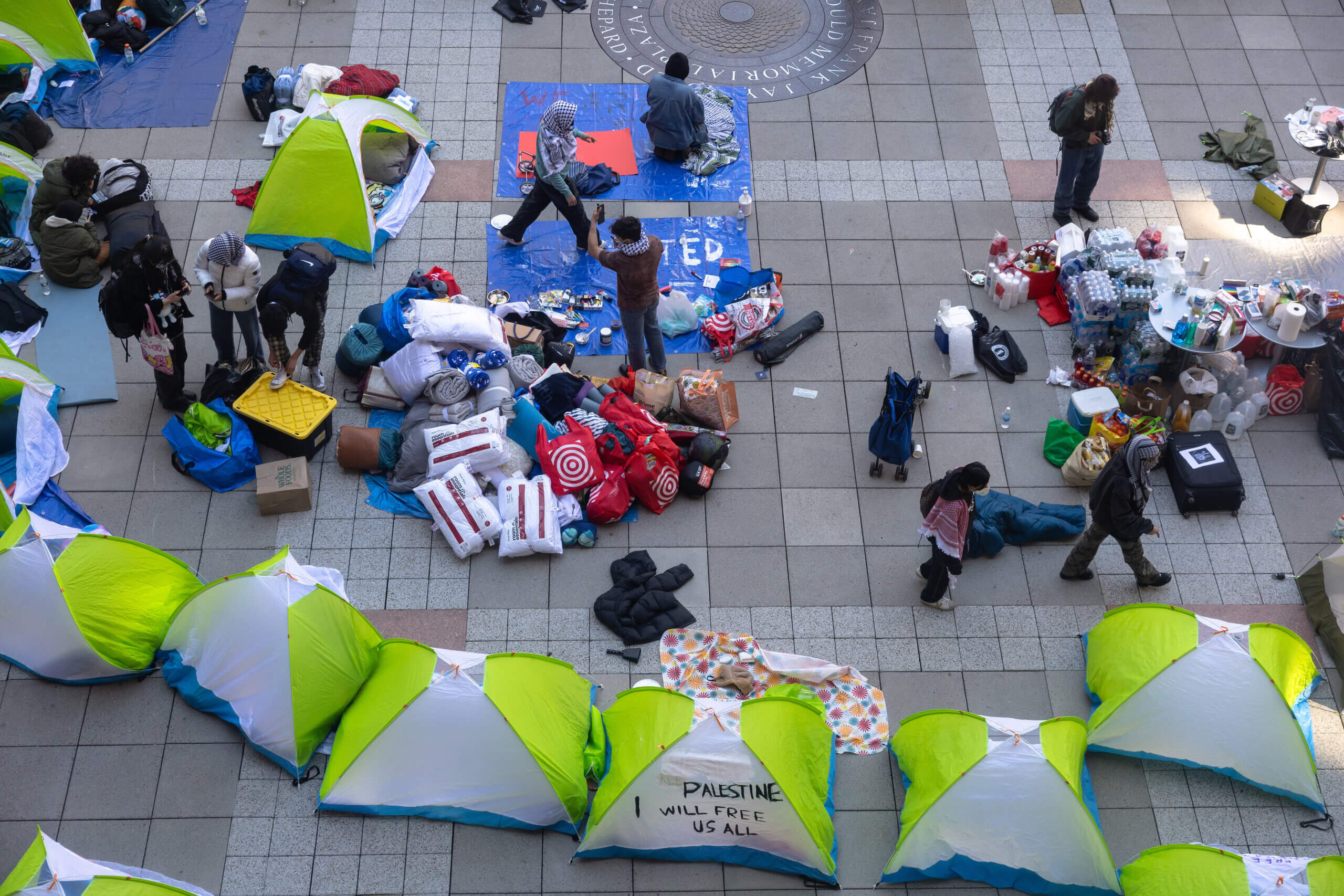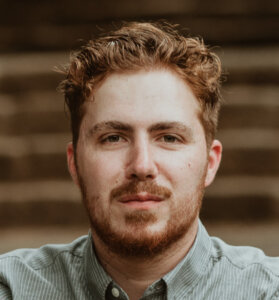With trust ‘broken,’ Columbia descends into chaos and protests spread
After the school arrested dozens of protesters last week, tent encampments are growing across the country and school officials are scrambling to respond

A Pro-Palestinian protest encampment at Columbia University. Photo by Getty Images
Phoebe Wagoner, a junior at Columbia University, was helping put together a Passover Seder to be held Monday night at the “Gaza solidarity encampment” at the center of campus. But with Columbia convulsing in chaos, Wagoner took a break from tracking down horseradish to join 30 other Jewish students for a workshop Sunday night on how to keep peace between pro-Palestinian activists occupying the school’s iconic South Lawn and the counterprotesters surrounding them.
“My main concern is trying to keep things calm,” Wagoner said in an interview.
Students, professors, politicians and national activists on all sides of the Israeli-Palestinian conflict and the struggles over campus free speech seemed to have lost confidence in the leadership of Columbia, whose president took the extraordinary step Monday of canceling in-person classes after her controversial move a few days before to have police arrest more than 100 demonstrators — only to allow students to erect a new encampment soon afterward.
The arrangement appeased nobody and the sidewalks outside Columbia’s Upper Manhattan campus, which was closed to the public, seethed Monday with what seemed like equal numbers of press, public officials and protesters from across the spectrum. Robert Kraft, the Jewish billionaire whose name adorns Columbia’s Jewish student center, said Monday he would stop supporting the school until corrective action is taken, and U.S. Rep. Mike Lawler, a Rockland County Republican, called for stripping federal financial aid from students at Columbia.
“These children are not entitled to it,” Lawler said at an impromptu news conference outside the campus. “It is a disgrace what is happening.”
Elsewhere pro-Palestinian demonstrators engaged in a call-and-response through a campus gate held shut with two bike locks.
“We don’t want no two states!” the protesters outside shouted.
“We remember ’48!” the students inside replied.
Encampments grow
Columbia’s decision last Thursday to bring in the New York Police Department to clear the first tent encampment and arrest scores of students for trespassing seems to have led to proliferation of similar actions across Manhattan and the country, with tents popping up at schools including the University of California, Berkeley; the University of Michigan; Yale, where the police arrested at least 47 protesters early Monday morning; and New York University, where police arrested students Monday night.
National Students for Justice in Palestine, a coordinating group for the loose network of campus clubs, launched a campaign called “Popular University for Gaza” Monday, calling on students to start more encampments demanding that universities drop investment holdings tied to Israel.
Iman Abid-Thompson, advocacy director with the US Campaign for Palestinian Rights, said that the crackdown by universities had breathed new life into the protest movement following more than six months of uneven activity at schools across the country. “Hundreds of people getting arrested at a time is going to bring attention,” she said.
Last week’s arrests also escalated tensions at Columbia, according to some students, who say that the number of participants in the lawn demonstration grew after the police left.
“Now it’s people standing for free speech and against police brutality and includes people who might not have gotten involved otherwise,” said Henry Sears, who leads the J Street U chapter at Columbia and has not participated in the protests.

Columbia has a long history of student activism, including a 1968 occupation that also culminated in police violence, and it has long been a hub for both Jewish students and faculty and those from the Middle East. That it is located in New York City and part of the Ivy League both also make it a magnet for media attention. But if Columbia is bearing the harshest glare of the spotlight right now, it is only one of many schools grappling with similar challenging decisions about how to respond to a new wave of campus activism that is testing policies on free speech.
Students furious at Israel’s war in Gaza, which followed the Hamas terrorist attack on Oct. 7, have been engaged in a delicate dance with administrators tasked with keeping the peace on campus and under pressure from national Jewish groups and donors demanding a harsh response to what they see as rising antisemitism within and around the protests.
School responses evolve
The first wave of calls was for university leaders to suspend clubs like Students for Justice in Palestine, which Columbia and a handful of others did in the late fall. But those sanctions typically only deprived members of access to a small amount of funding and the ability to reserve meeting rooms on campus; the movement around them was much larger and continued apace.
Brandeis University was the first school to both suspend its SJP chapter and arrest several students who participated in an unauthorized demonstration on campus objecting to the suspension. Some schools suspended and then reinstated the clubs, though Columbia has not and is currently being sued over the matter.
The focus, in any case, quickly shifted from the quad to the administration buildings.

Liz Magill and Claudine Gay, the presidents of the University of Pennsylvania and Harvard University, respectively, were forced to resign after disastrous testimony before a Congressional committee in December in which they failed to state clearly that calling for “Jewish genocide” violated their campus rules.
Columbia’s president, Nemat Shafik, was asked to appear at the same hearing, but begged off citing a scheduling conflict. She instead appeared on Capitol Hill last week, and seemed to avoid any major gaffes — and stated that calling for genocide against Jews would not be allowed at Columbia — until she returned home to confront the Gaza encampment.
The passage of time between the hearings or since Oct. 7 has not led to any clarity on where lines around provocative campus speech should be drawn to protect both student expression and student safety. Columbia’s antisemitism task force has notably refused to explain what it considers to be antisemitic — or how to ensure classes and events like graduations can take place smoothly.
“If you don’t characterize the protests as antisemitic in any way then it’s easy to just characterize this as free speech and put the onus on those who wish to restrict it,” said Dov Waxman, chair of Israel studies at UCLA. “Whereas, if you characterize it as antisemitism, then it becomes hate speech and it does shift the onus somewhat on those who are saying it should be allowed.”
Divergent Jewish experiences
At Columbia, that debate has somewhat obscured what almost all Jewish students agree is a tense campus where political disagreements have boiled over into personal attacks, slurs and even some threats.
Activists have allegedly sought to burn an Israeli flag. Anti-Zionist Jewish students have been accosted walking to the subway while pro-Israel students have been harassed outside their dorms, and elsewhere told to “go back to Poland.” Jacob Schmeltz, the Columbia representative of Jewish on Campus, said visibly Jewish students have had objects thrown at them, and one was told to “kill himself.”
“People are going up to and screaming at each other,” said Schmeltz, a senior studying politics and history, adding that some of the most menacing rhetoric has come from demonstrators standing outside school gates, many of whom are not students.
“People are screaming that they are Hamas and that they love Hamas,” he said. “People are screaming that they want another Oct. 7.”
Some Jewish students who have participated in the Gaza solidarity encampments and anti-Zionist groups like Jewish Voice for Peace said they have also faced offensive attacks. In an interview with the student newspaper last week, Shai Davidai, a Columbia professor who has emerged as a leading counterprotester, compared such Jewish activists to the “kapos” and “Judrenrat” who worked with Nazis during the Holocaust.
“I am sorry, but it is not a big achievement to be on the last train to Auschwitz,” Davidai said.
Wagoner, the junior planning the Seder for the protest encampment, is a member of a group called Columbia Jews for Ceasefire. She said that when a group of Jewish students tried to speak about Davidai’s comments at a Hillel meeting Sunday night about antisemitism, they were jeered at and shouted down by the crowd.
“We’re also Jewish students and we’re also concerned about antisemitism,” she noted.
A rare point of unity between both sides seems to be frustration with Columbia’s response to the protests. Students took to social media last week to cheer on a billboard truck driving around campus with a message for Shafik, who is known as Minouche: “It’s time to resign, and we’re here to help you move.”
The mobile billboard was sponsored by a conservative group angry that Shafik had not taken a harder line earlier to crack down on campus demonstrations against Israel. But the message resonated with many pro-Palestinian students as well, especially after Shafik shut down the first tent encampment.
“Trust between the students and the administration was already low before this and now it is broken,” said Sears, the J Street leader. “I’m not sure how the university, honestly, will be able to move forward.”
Mira Fox contributed to this article.






















